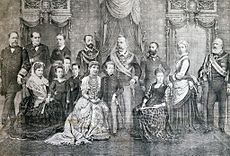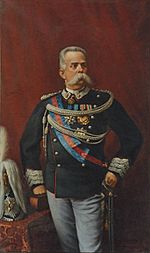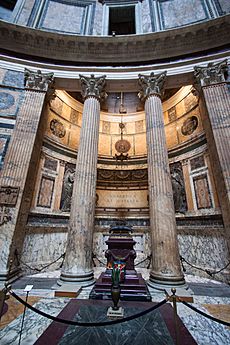Umberto I of Italy facts for kids
Quick facts for kids Umberto I |
|||||
|---|---|---|---|---|---|
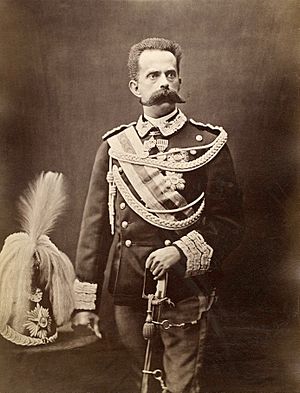
Portrait of Umberto I in 1887
|
|||||
| King of Italy (more...) | |||||
| Reign | 9 January 1878 – 29 July 1900 | ||||
| Predecessor | Victor Emmanuel II | ||||
| Successor | Victor Emmanuel III | ||||
| Prime Ministers |
See list
Agostino Depretis
Benedetto Cairoli Francesco Crispi Antonio Starabba Giovanni Giolitti Luigi Pelloux Giuseppe Saracco |
||||
| Born | 14 March 1844 Turin, Kingdom of Sardinia |
||||
| Died | 29 July 1900 (aged 56) Monza, Kingdom of Italy |
||||
| Burial | Pantheon, Rome | ||||
| Spouse | Margherita of Savoy | ||||
| Issue | Victor Emmanuel III | ||||
|
|||||
| House | Savoy | ||||
| Father | Victor Emmanuel II | ||||
| Mother | Adelaide of Austria | ||||
| Religion | Roman Catholicism | ||||
| Signature | |||||
Umberto I (born Umberto Ranieri Carlo Emanuele Giovanni Maria Ferdinando Eugenio di Savoia; 14 March 1844 – 29 July 1900) was the King of Italy from January 9, 1878, until he was assassinated in 1900.
During his time as king, Italy tried to expand its control into parts of Africa. They successfully gained land in Eritrea and Somalia. However, they were defeated by Abyssinia at the Battle of Adwa in 1896. In 1882, King Umberto I also approved the Triple Alliance with the German Empire and Austria-Hungary.
Some groups, especially anarchists, did not like King Umberto I because of his traditional views and his support for military actions, like the Bava Beccaris massacre in Milan. He was attacked by an anarchist early in his reign and was later killed by another anarchist, Gaetano Bresci, in 1900.
Contents
Early Life and Military Career
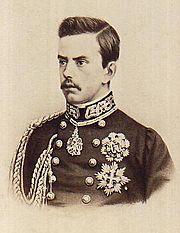
Umberto was born in Turin, the capital of the Kingdom of Piedmont-Sardinia, on March 14, 1844. His father was Victor Emmanuel II, and his mother was Archduchess Adelaide of Austria.
From March 1858, Umberto began a military career in the Royal Sardinian Army. He served as a captain. He took part in the Italian Wars of Independence. He was present at the battle of Solferino in 1859. In 1866, he commanded a division at the Villafranca battle, which followed Italy's defeat at Custoza.
On April 21, 1868, Umberto married his first cousin, Margherita Teresa Giovanna, Princess of Savoy. Their only son was Victor Emmanuel, who became the Prince of Naples. Queen Margherita was known for her cultural interests and strong personality, which helped make the monarchy more popular.
When Umberto became Crown Prince, his father did not involve him much in politics. However, Umberto later worked to pay off the debts his father had accumulated. He was known for not being very interested in books or art, preferring military matters.
Becoming King and First Attack
Umberto became king after his father's death on January 9, 1878. He chose the title "Umberto I of Italy" instead of "Umberto IV" (of Savoy). He also agreed that his father should be buried in the Pantheon in Rome.
While on a trip around the kingdom with Queen Margherita and Prime Minister Benedetto Cairoli, Umberto was attacked. An anarchist named Giovanni Passannante tried to stab him during a parade in Naples on November 17, 1878. The King used his sword to block the attack, and Prime Minister Cairoli was hurt trying to defend him. Passannante was sentenced to life in prison.
Foreign Policy and Expansion
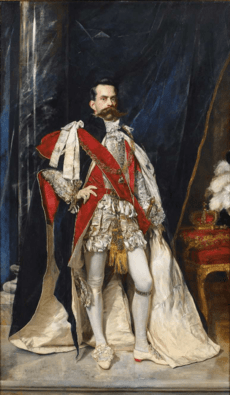
In foreign policy, King Umberto I supported the Triple Alliance with Austria-Hungary and the German Empire. He visited Vienna and Berlin many times. Some people in Italy did not like this alliance because Austria had been an enemy in the past and still controlled areas Italy wanted. Umberto I was a strong supporter of the military.
A big challenge for the prime ministers chosen by Umberto was the power of organized crime in southern Italy. The Mafia in Sicily and the Camorra in Campania were very powerful. These groups often influenced elections by helping politicians get votes in exchange for allowing their criminal activities. Southern Italy was a very poor region with low literacy rates. The king preferred to spend a lot of money on the military rather than on social improvements like schools.
Umberto also supported Italy's plan to expand its colonies. In 1885, Italy occupied Massawa in Eritrea. Italy also expanded into Somalia in the 1880s. King Umberto wanted to conquer Ethiopia, even though many people in Italy were against it. He supported Prime Minister Francesco Crispi, who also believed in expanding Italy's empire.
After Italy's defeat at the Battle of Adwa in Ethiopia on March 1, 1896, public anger grew. People were frustrated with the unpopular war. Despite this, Umberto still wanted to expand Italy's empire in Africa.
In 1899, Italy tried to gain a coastal city in China as a concession, similar to what other European powers had done. The Chinese government refused. Later, in the summer of 1900, Italian forces joined other nations in the Boxer Rebellion in China. After Umberto's death, Italy gained a concession territory in Tientsin.
Umberto I also had a firm stance on the Holy See (the Pope). He declared that Rome was "untouchable" and would always belong to Italy.
Social Unrest and the Bava Beccaris Massacre
Umberto I's reign was a time of social change and tension in Italy. There were protests due to rising bread prices and the spread of new ideas like socialism. Many people were also against Italy's colonial plans.
On May 7, 1898, large protests over bread prices took place in Milan. General Fiorenzo Bava Beccaris ordered his soldiers to fire on the demonstrators. This event, known as the Bava Beccaris massacre, resulted in many deaths and injuries. King Umberto sent a telegram to congratulate General Bava Beccaris for restoring order and later gave him a military medal. This action greatly angered many people in Italy.
Assassination
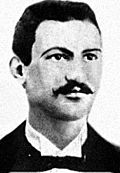
On the evening of July 29, 1900, King Umberto I was assassinated in Monza. He was shot four times by Gaetano Bresci, an anarchist from Italy who had lived in America. Bresci stated he wanted to get revenge for the people killed during the Bava Beccaris massacre in Milan in May 1898.
Umberto I was buried in the Pantheon in Rome on August 9, 1900, next to his father, Victor Emmanuel II. He was the last king from the House of Savoy to be buried there. His son and successor, Victor Emmanuel III, died in exile and was buried elsewhere until his remains were moved to Vicoforte in 2017.
The assassination of Umberto I later inspired American anarchist Leon F. Czolgosz to assassinate President William McKinley in September 1901.
Images for kids
-
Menelik II's victory over Italians at Battle of Adwa
-
Umberto's coat of arms as a knight of the garter
See also
 In Spanish: Humberto I de Italia para niños
In Spanish: Humberto I de Italia para niños
 | DeHart Hubbard |
 | Wilma Rudolph |
 | Jesse Owens |
 | Jackie Joyner-Kersee |
 | Major Taylor |


